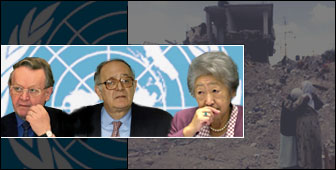UN team prepares for Jenin as Israel objects to Swiss

The Israeli government is divided about the presence of former Red Cross chief, Cornelio Sommaruga, in the UN fact-finding team to Jenin.
Israel says it wants a change in the composition of the team, which consists of former Finnish President Martti Ahtisaari, the former head of the United Nations Refugee agency, Sadako Ogata and Sommaruga, the Swiss who is former president of the International Committee of the Red Cross.
The three have been meeting in Geneva to discuss their mission. UN Secretary General Kofi Annan, who handpicked them, has rejected an Israeli request to delay their arrival, which is now expected on Saturday.
But he is scheduled to meet Israeli officials later on Wednesday to discuss their objections to the mission. It’s not clear if this will include a request to drop Sommaruga from the team.
Cabinet divisions
When asked by swissinfo if he felt there was an Israeli campaign against his participation, the former ICRC chief said he did not want to comment, for fear of “feeding the controversy”.
Officially, Israeli officials in Geneva are refusing to comment on the personalities involved, saying they would prefer to talk about the terms of reference of the mission. Israel would also like to see military and anti-terror experts in the team, something the UN has not ruled out.
But sources in Jerusalem say there are divisions between the Israeli prime minister, Ariel Sharon, and the foreign minister, Shimon Peres, about the inclusion of Sommaruga, who some on the right consider to be anti-Israeli.
Several Israeli newspapers on Wednesday quoted government sources as saying they were opposed to Sommaruga’s participation.
Sharon is already under pressure from hard line members of his cabinet, who are upset that he has agreed to the UN mission. Opposition to Sommaruga’s presence would be in line with the prime minister’s decision to sever contacts with the UN envoy to the Middle East, Terje Larsen, who had criticised the Israeli actions in Jenin and described the scenes there as “horrifying beyond belief”.
Not about individuals
Israeli diplomats, however, have sought to deflect attention away from the “Sommaruga question”.
“You’ve heard nothing official about members of the delegation,” says Israel’s ambassador to the UN in Geneva, Yaakov Levy. “It’s not an issue of individual members of the team.”
“In principle, we are not opposed to this fact finding mission, as we have nothing to hide,” Levy told swissinfo. “When the fact-finding mission goes over, I’m sure our statements will be corroborated.”
The Israelis deny Palestinian claims that hundreds of people, including civilians, were massacred in the Jenin refugee camp, and that many people died when the Israeli army bulldozed houses with people still inside.
Emblem issue
There have been attempts in the past to paint Sommaruga as anti-Israeli and even anti-Semitic, because of his refusal to allow the Israeli humanitarian organisation, Magen David Adom, into the Red Cross fold.
The reason it remains excluded is because its symbol – the Red Star of David – is not a recognised emblem and could open the way to a proliferation of emblems that would dilute the protective power of the Red Cross and Red Crescent.
Israeli Foreign Ministry officials say one supposedly anti-Semitic quote attributed to the former ICRC chief has been taken wholly out of context. They also acknowledge that Sommaruga was behind the compromise that would have allowed Israel into the Federation of Red Cross and Red Crescent Societies – a third neutral symbol into which a society’s own emblem could be incorporated.
But there is no doubt that during Sommaruga’s tenure, relations between the ICRC and the Israeli government reached a low point, largely due to allegations of torture against the Israeli security services.
Even if Israel insists that it has no objection to the presence of Sommaruga on the team, it is clear that there remains a considerable gulf between the ICRC and Israel with regard to the implementation of international humanitarian law in the Palestinian Territories.
Israel sees the West Bank not as an occupied territory, but as “disputed” land. As such, it believes the Fourth Geneva Convention – which covers the treatment of civilians during wartime or during military occupation – is not applicable there.
On Tuesday, the ICRC said there was little doubt that Israel had breached international humanitarian law in the Jenin refugee camp in attacking civilians, destroying civilian property and preventing emergency medical aid reaching the wounded.
by Roy Probert

In compliance with the JTI standards
More: SWI swissinfo.ch certified by the Journalism Trust Initiative
You can find an overview of ongoing debates with our journalists here . Please join us!
If you want to start a conversation about a topic raised in this article or want to report factual errors, email us at english@swissinfo.ch.